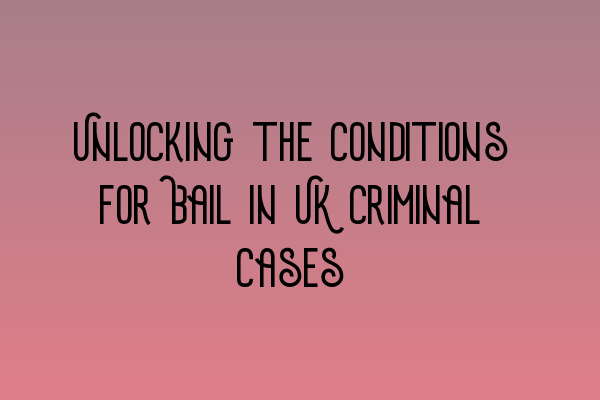Unlocking the Conditions for Bail in UK Criminal Cases
When individuals are accused of a crime and arrested, the next step is often determining whether they should be granted bail or remanded in custody pending trial. Bail is the legal process that allows an accused person to be released from custody, subject to certain conditions. In this article, we will explore the conditions for bail in UK criminal cases.
The Purpose of Bail Conditions
The primary purpose of imposing bail conditions is to ensure that the accused person returns to court for their trial and to protect the public from any potential harm. The court considers various factors when determining the appropriate conditions, including the nature and seriousness of the alleged offense, the individual’s criminal history, their ties to the community, and the risk of flight.
In accordance with SQE Criminal Law & Practice Law UK, it is important for legal professionals to understand the specific conditions that may be imposed to secure bail for their clients. By having a comprehensive knowledge of the conditions, solicitors can effectively advocate for their clients’ interests.
Types of Bail Conditions
There are several common types of bail conditions that can be imposed in UK criminal cases. These conditions may vary depending on the individual circumstances of each case. It is essential to discuss the specific conditions with a qualified solicitor.
One common condition is a curfew, which requires the accused person to remain at a specified place during specific hours. This condition aims to restrict movement and limit the person’s ability to commit further offenses or interfere with potential witnesses. Violating the curfew can result in the revocation of bail.
Another common condition is a requirement to report to a police station on a regular basis. This condition allows authorities to maintain regular contact with the accused person and monitor their activities. Failure to comply with reporting conditions may lead to the withdrawal of bail.
A “non-contact” condition may be imposed in cases where the accused person is involved in a domestic violence-related offense. This condition prohibits any direct or indirect contact with the alleged victim to ensure their safety and wellbeing.
Additionally, the court may impose a financial security condition, requiring the accused person to provide a sum of money as a guarantee to ensure their attendance at court. This is known as a surety, and failure to comply can result in the forfeiture of the amount provided.
Electronic monitoring is another bail condition that may be imposed, particularly in more serious criminal cases. This involves wearing a device that tracks the person’s location, ensuring that they do not breach any geographical restrictions set by the court.
Other potential conditions may include surrendering passports, refraining from engaging in certain activities or associating with specific individuals, and attending drug or alcohol rehabilitation programs as necessary.
Conclusion
In conclusion, the conditions for bail in UK criminal cases play a crucial role in the justice system. It is essential for solicitors to have a deep understanding of these conditions to effectively advocate for their clients. By recognizing the potential types of conditions, legal professionals can guide their clients through the process and work towards the best possible outcome.
To learn more about SQE exams and preparation, consider exploring our related articles:
SQE 1 Practice Mocks FLK1 FLK2
